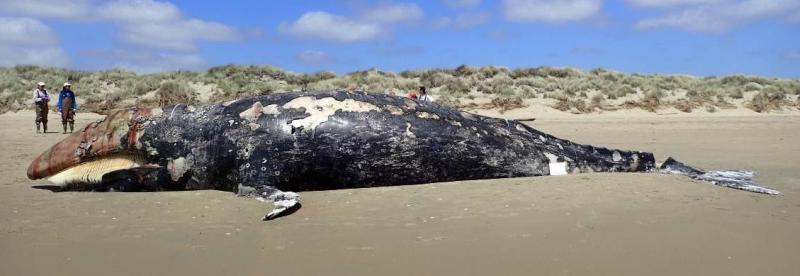 In early April, four gray whales were found dead in the San Francisco Bay area in a span of eight days. Last week another three dead gray whales washed ashore in the Bay area. Further north, a dead gray whale was also found on Klipsan Beach, WA, last week.
In early April, four gray whales were found dead in the San Francisco Bay area in a span of eight days. Last week another three dead gray whales washed ashore in the Bay area. Further north, a dead gray whale was also found on Klipsan Beach, WA, last week.
The deaths are a continuation of elevated gray whale strandings occurring along the west coast of North America from Mexico through Alaska since January 1, 2019. Scientists with the National Oceanic and Atmospheric Administration (NOAA) have declared the occurrences as an “unusual mortality event,” or UME, defined by the federal Marine Mammal Protection Act as an unexpected and significant die-off of a marine mammal species requiring an immediate response.
According to NOAA, there were 214 gray whale strandings on the west coasts of the United States, Canada, and Mexico in 2019, 174 in 2020, and 66 so far in 2021.
In a 2009 report, NOAA scientists suggested that recorded strandings represent only 4-13 percent of all dead gray whales. “For every gray whale, particularly along our coast, that you might find stranded on a beach dead, there could be nine or ten out there in the ocean that you never saw,” says Bill Keener, a research associate on The Marine Mammal Center’s Cetacean Field Research Team.
Why are gray whales stranding? NOAA comments that “full or partial necropsy examinations were conducted on a subset of the whales. Preliminary findings in several of the whales have shown evidence of emaciation. These findings are not consistent across all of the whales examined, so more research is needed.”
There are concerns that climate change is reducing the gray whale supply of small invertebrates called amphipods, the whales’ primary food supply in the Arctic. Ship strikes are also a threat. Three of the whales that have recently washed ashore in San Francisco Bay showed signs of being struck by ships.
A report released by NOAA in January estimates that gray whales have declined by at least 23.7 percent since 2016.
